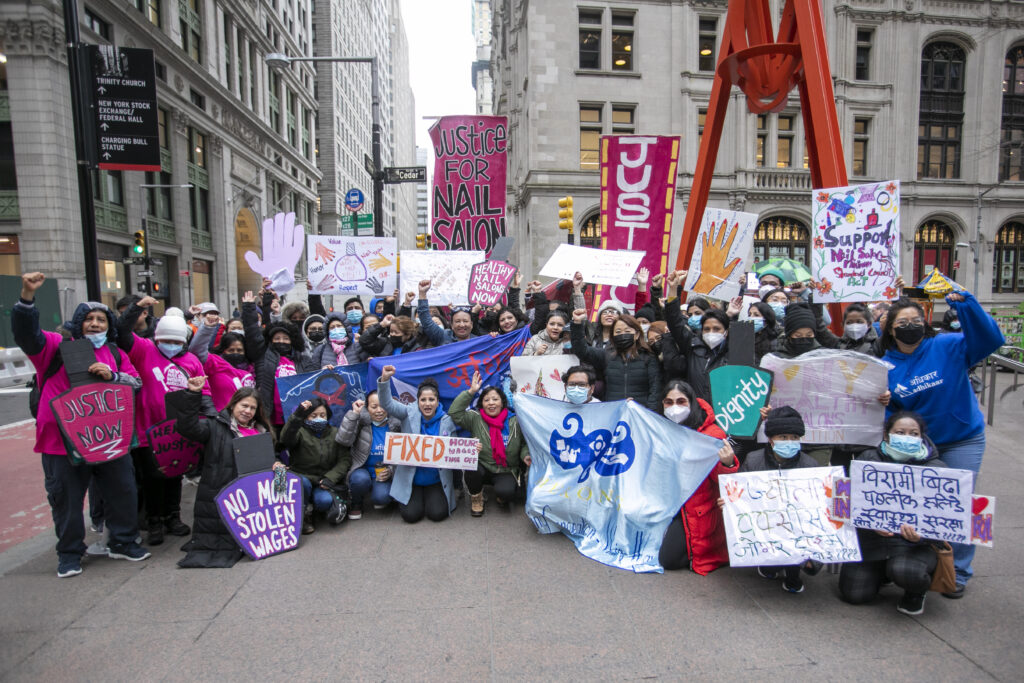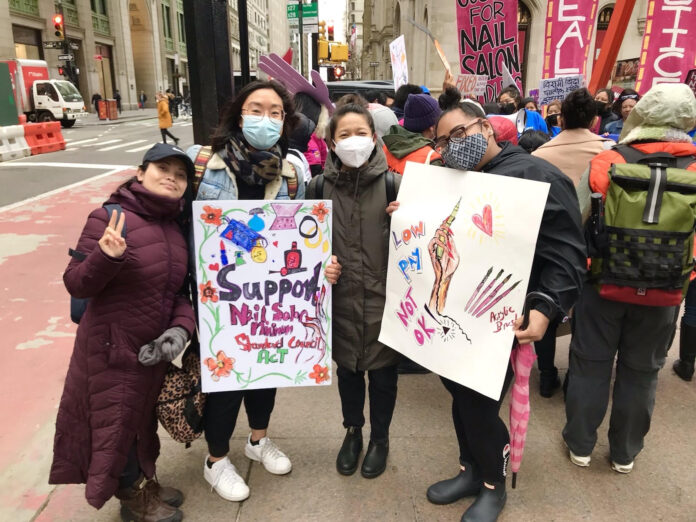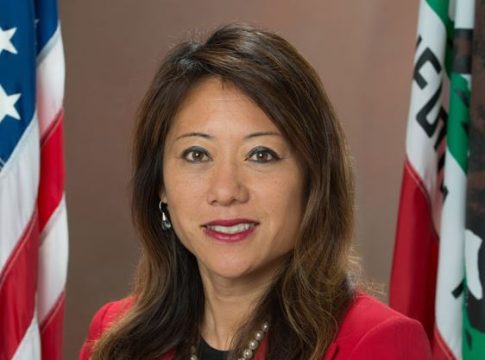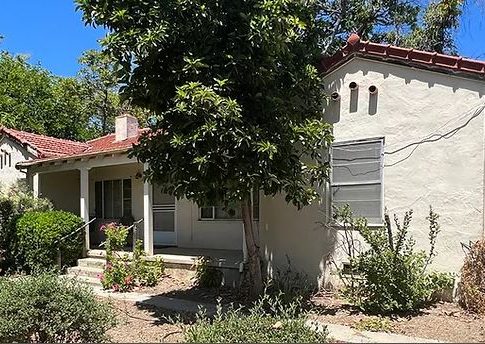Even after all these years, Catherine Kien recalls going into a nail salon to assist her relatives and being hit with a waft of toxic chemicals as soon as she walked through the front door.
Kien comes from a household of nail technicians, and she remembers her grandmother coming home with rashes and eczema. After Kien’s grandmother immigrated from Vietnam, she entered the nail salon industry, where she still works in after nearly 30 years.
The nail tech salon industry is predominantly Vietnamese Americans and Southeast Asian Americans, with New York having the highest concentration of nail technicians and nail salons in the U.S., consisting of 73% AAPI and 88% foreign-born workers. Almost half of technicians have limited English proficiency, which employers often take advantage of.
A bill designed to improve conditions for these workers across the state is closer to passing.
The Nail Salon Minimum Standards Council Act (S1800/A378) would establish a regulatory body that will “investigate wages and standards within the nail salon industry,” as well as recommend improvements, according to the bill’s description. It will also require set hours, health insurance, compliance with minimum wage requirements and language access for immigrant workers.
LATEST STORIES
In previous years, the state has paid over $2 million in back wages and damages to nail salon technicians, particularly after a New York Times expose, alleging that many places employed undocumented workers and paying them nearly half of the minimum wage at the time, $9 an hour. Then-Gov. Andrew Cuomo created the Nail Salon Industry Enforcement Task Force, led by the New York State Department of Labor, to tackle the reports of exploitation.
But the status quo is not enough, said Anna Srey, a community organizer with Mekong NYC, which is supporting the Nail Salon Minimum Standards Council Act. If passed, the Nail Salon Minimum Standards Council Act “will ensure workers have the recourses and authority to fight back,” she said.
Currently, “Persons employed in the nail salon industry in New York are subjected to wages and inadequate working conditions including health and safety protections,” the Nail Salon Minimum Standards Council Act states.
“At the same time, unfair competition exists between employers who break the labor law by not following minimum wage standards and employers that follow the law,” it continues. “Low pricing and minimum wage violations threaten the stability of the industry, and often require that wages be supplemented by the payment of public moneys or relief or other public and private assistance.”
Kien, now a community organizer and Srey’s colleague, agrees that “the law now isn’t as strong as it could be.”
She explained that the Nail Salon Minimum Standards Council Act is more of a long-term guarantee for the workers in the over 5,000 salons across New York. For instance, the proposed regulatory board would meet every two years to be up to date on current issues—something, she said, which would have been helpful during the COVID-19 pandemic while millions of essential workers raised concerns over the lack of workplace safety protections.
In addition, nearly 85% of nail salon industry in New York are women—and women of color, often immigrants, more disproportionately affected.
In addition to a workers’ rights issue, “this is a gender and race issue,” Kien stressed. Despite persistent stereotypes of the model minority myth, “that’s not reality … especially for poor, working Southeast Asian women and refugees … Nail salon work is all we know.”
Srey knows firsthand how grueling the industry can be: she worked in the same salon for 15 years before changing careers and joining Mekong NYC. The multiservice nonprofit is based in the Bronx, providing direct services such as mutual and legal aid; it also campaigns with other groups to promote and preserve Southeast Asian culture, as well as raises awareness about issues such as deportation.

But improving conditions for nail salon workers remain close to Srey’s heart. Despite the creative joy and pride she took in her work, she recalls no breaks, personal days, pensions, health insurance or benefits—and sometimes taking home only $50 a day, not enough for her and for children.
The issue, she says, persists today, with many still getting paid under the state minimum wage of $15 an hour. Many lost their main source of income during the pandemic when many nail salons had to close and are still recovering after three years. With rising prices, too, customers take it out on the workers—or leave without paying at all.
“It shouldn’t be the standard that you work 12 hours a day and only take home $100,” Kien said.
In addition to the dismal pay, there are health concerns. The technicians regularly breathe in carcinogens, also known as “the toxic trio” of dibutyl phthalate, toluene and formaldehyde. These can also cause a variety of symptoms, including breathing problems; eye, skin and throat irritation; and birth defects and reproductive harm, according to the Occupational Safety and Health Administration (OSHA) and the Environmental Protection Agency (EPA).
The danger is increased with the long hours enclosed in small spaces with no PPE or ventilation—and nail salon technicians were often not informed of or fully understood the effects. Srey even recalls eating lunch at the same table where nail products were.
Since January, organizations such as Mekong NYC and the Asian Pacific American Labor Alliance, along with nail salon technicians and labor unions, have been asking for support, including travelling to Albany to personally petition lawmakers.
Last year, they sounded the alarm over the unsafe working conditions, low pay and long working hours. However, the old version of the Nail Salon Minimum Standards Council Act did not pass due to lack of support. The current version has exited the Senate Labor Committee, and it has since gained 18 sponsors in the Senate and 20 in the state assembly; Assemblymember Harry Bronson and Sen. Jessica Ramos re-introduced the bill earlier this year.
Srey and Kien feel optimistic about the bill’s chances this time around.
“Setting the standard would mean so much … and heal a lot of the trauma our community members went through, so they don’t have to suffer silently anymore,” Kien said. “Any Southeast Asian person you know—they have someone in their family or their circle who does nails and has a story about it.”
Mekong NYC is also looking to starting a nail salon school of their own. Currently, they’re working on getting instructor licenses and outreach—with a little help from familiar faces, including Kien’s grandmother.
“We’re hoping to connect with her salon and other salons to get their certifications,” Kien said.
Srey is drawing on her own experience, too: “The school curriculum is all about safety—the conditions, the work, how to protect themselves from harmful chemicals.”
AsAmNews is published by the non-profit, Asian American Media Inc. Make a tax-deductible donation of at least $40 or pledge a monthly recurring donation of at least $10 by August 31 and receive a free copy of The Legend of Mu Lan: Heroine of Ancient China, the inspiration for the classic Disney movie. We are supported in part by funding provided by the State of California, administered by the California State Library in partnership with the California Department of Social Services and the California Commission on Asian and Pacific Islander American Affairs as part of the Stop the Hate program. To report a hate incident or hate crime and get support, go to CA vs Hate.









